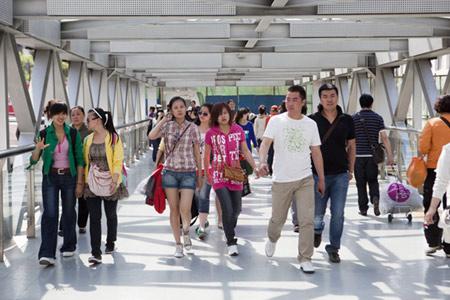
Pedestrians walk through a shopping district in Beijing. Economists estimated that the service sector will account for about 41 percent of the country's total economic output in 2010. [Agencies]
Five-Year Plan needs to focus more on structural adjustment: Experts
BEIJING - Senior Chinese economists warned that China is entering "a complicated transitional period" as the painful economic restructuring drive could be a serious test of the country's sustained economic growth over the next decade.
With China's per capita gross domestic product rising to some $4,200 next year, the country is likely to enter into "a complex upper middle-income bracket" that is at risk of being caught in the middle-income trap, said Zhang Ping, deputy head of the economic research institute at the Chinese Academy of Social Sciences.
"It is necessary for the country to start readjusting its policy portfolio right away to support consumption and the service sector, otherwise the cost of economic restructuring will be even higher," he said.
Zhang made the remarks at the 2010 Forum on China's Economic Growth and Business Cycle, at which economists from across the nation gathered to discuss policy choices for the country's future economic growth.
With policymakers set to draft the 12th Five-Year Plan, the national agenda for the social and economic development between 2011 and 2015, economists suggested it was necessary to lower the country's economic growth target and pay more attention to structural adjustment.
"We have no doubt about the growth of China's GDP over the next five years, which could still remain around 9.5 percent, but the structural problem has become increasingly striking," Zhang said.
Cai Zhizhou, a professor at Peking University, said his research team suggested the country to set the GDP growth target for the next five years at 7 percent, lower than the 7.5 percent the country set for the five-year period between 2006 and 2010, and focus on boosting the service sector and income growth.
China's economic growth relies heavily on industrial expansion and energy consumption.
Economists estimated that the service sector will account for about 41 percent of the country's total economic output in 2010, failing to reach the 43 percent target set by policymakers in the 11th Five-Year Plan (2006-10).
"The service sector is growing slowly due to the country's excessive reliance on industrial growth, and it failed to become a job creator, as 40 percent of the population still depend on agricultural production," Cai said.
Moreover, economists also warned of the risk brought by the country's recent bout of debt expansion, which was the critical stimulus propping up the flagging economy during the global financial crisis.
Zhang estimated that the country's debt-to-GDP ratio has reached 53 percent, if hidden debts, such as the massive bank loans borrowed by the investment entity backed by local government last year and the bad debts the government peeled off from the commercial lenders during the overhaul of State-run banks, are taken into account.
"The debt level is lower than that of the international peers, but the risks will loom large in the next five years and put more pressure on the country's economic restructuring drive," he said.





